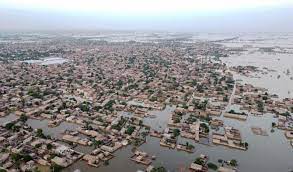
Delay In IMF Visit Over Flood Impact On Budget
Delay In IMF Visit Over Flood Impact On Budget
Pakistan and the International Monetary Fund (IMF) have developed disagreements on the financial effect of the flood damages, which has significantly delayed the dispatch of an IMF team to Islamabad for the next review of its loan program.
According to a finance ministry estimate, the main budget shortfall in the current fiscal year might reach over Rs2.2 trillion without extra steps, sources informed The Express Tribune. Both parties have been working to close the gap in light of this information.
A senior government official stated, “Although the figure is still speculative, our study has shown that the primary budget deficit — the revenues after paying the interest expense — might be as high as 2.8% of the GDP or Rs2.2 trillion.”
The expected amount exceeds the primary budget surplus objective of 0.2% of GDP that was set with the IMF in the pre-flood scenario by a significant margin.
The difficulty, according to the sources, is that the slippages are primarily due to non-flood reasons. Authorities also stated that the floods’ impact on the budget was less than 0.2% of the GDP.
The sources claimed that despite recent discussions with IMF Resident Representative Esther Perez, there was still a dispute on how much of the anticipated $16 billion reconstruction expenditure should be accounted for in the current fiscal year.
According to Pakistan, the cost of rehabilitation had no appreciable effect on the remaining time of the program, which expires in June. The IMF, however, rejected it. Next week, Pakistan will provide the IMF with updated data that will help the international lender decide whether to schedule a mission to Islamabad this month or postpone it until December.
There are still $3 billion in unpaid IMF loan funds that can only be released until three evaluations have been completed.
Aside from disagreements over the overall financial system, Pakistan has struggled to comply with other IMF requirements, such as raising power tariffs.
According to the updated timetable agreed upon in June, the IMF was supposed to send a delegation to Pakistan for the 9th review in October, which would have cleared the way for the delivery of a further tranche of around $1.2 billion on November 3. But under the disguise of things that can be resolved, the global lender is taking longer than expected.
“Pakistan has been requested by the IMF to assess how the floods have impacted the economy and budget. The dates of the IMF mission’s arrival won’t be known until the ramifications are understood, according to Dr. Aisha Ghaus Pasha, the state minister of finances.
“Pakistan has been requested by the IMF to assess how the floods have impacted the economy and budget. The dates of the IMF mission’s arrival won’t be known until the ramifications are understood, according to Dr. Aisha Ghaus Pasha, the state minister of finances.
She continued by saying that the flood effect analysis was still lacking, which is why the visit’s dates were unclear.
The resident representative of the international lender last week issued a succinct statement in which he said, “The IMF continues to engage with the authorities under the existing program to support their initiative to offer relief to the vulnerable population hit by the floods, progress reconstruction activities while guaranteeing sustainable policies.
However, she did not reply to a question about whether any date was finalized or not.
The sources said that the major issue was the slippages on account of the primary budget deficit, now being worked out around 2.8% of the GDP. They noted that the budgeted debt servicing cost was estimated at less than Rs4 trillion. However, the revised estimates indicated that the debt cost might jump as high as over Rs4.7 trillion, they added.
Similarly, the sources said, the revenues on account of petroleum levy might remain below the budgeted target of Rs855 billion by at least Rs300 billion. The net impact of low petroleum levy collection and high debt servicing cost was nearly 1.3% of the GDP, they added.
The IMF has already proposed the imposition of new taxes of Rs600 billion. The Federal Bureau of Revenue (FBR) collection may possibly fall short of the yearly target of Rs7.470 trillion. Additionally, the government has provided a Rs 100 billion subsidy that is solely available to exporters as well as an agricultural package, the effects of which are still unknown.
For the finance ministry, this has made things more difficult.
The government has been attempting to incorporate some of the costs associated with the agricultural package under flood assistance, which the farmers required following the catastrophic damage to the crops. However, it is challenging to defend the exporters’ subsidies given that they have been draining the nation’s resources without providing any substantial returns.
The IMF has already proposed the imposition of new taxes of Rs600 billion. The Federal Bureau of Revenue (FBR) collection may possibly fall short of the yearly target of Rs7.470 trillion. As per a report by the finance ministry, the overall impact of direct and indirect subsidies to exporters during the most recent fiscal year was Rs536 billion, including low-cost loans.
In contrast to the World Bank’s forecast, the central bank has assessed the current account deficit for the current fiscal year to be less than $10 billion.
According to the sources, another problem is the need for foreign finance, which Finance Minister Ishaq Dar has been attempting to resolve by making appeals to the UAE, Saudi Arabia, and China.
In February of the following year, a $2 billion UAE loan matures. According to the sources, the finance minister asked the UAE to extend it further this week.



